|
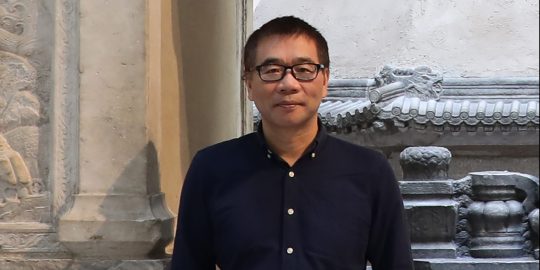 |
Jinhua Chen officially welcomed into the Royal Society of Canada
On December 2, scholars from across the university, as well as members of the community beyond UBC, gathered online to celebrate Dr. Jinhua Chen's election as a Fellow of the Royal Society of Canada. First established in 1882, the Royal Society of Canada recognizes Canadian scholars, artists, and scientists, peer-elected as the best in their field.
Our Department Head, Dr. Sharalyn Orbaugh, officially welcomed everyone, before keynote remarks were made by UBC's Dean (Faculty of Arts), Dr. Gage Averill, and Asian Studies faculty members Dr. Joshua Mostow, Dr. Ross King and Dr. Christina Laffin, all of whom highlighted Jinhua's tremendous tenacity and dedication to his work over the years.
Over 30 congratulatory videos and letters were sent by Jinhua's colleagues, friends and mentors worldwide; these were edited into a brief video, which, along with the full individual videos and letters, can all be viewed here.
Congratulations again Jinhua, and thank you to everyone who helped organise the event or contributed a message! |
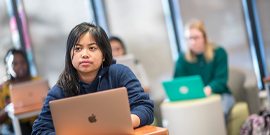 |
Tell us your Update thoughts!
"He who knows all the answers has not been asked all the questions." Confucious
(We presume he was talking about our Update end-of-year reader survey)
Oh! Well, speaking of that...if you enjoy reading The Update, we'd indeed love you to tell us why, and how we can make it even better in 2021.
Click right here to access it!
|
|
 |
Part 2 of Q&A with Dr. Sunnie Wang
Recently UBC's Faculty of Arts published Part One of a Q&A with three faculty professors, exploring how they had successfully transitioned to teaching online.
Part Two has just been published, and once again, features Dr. Sunnie Wang in our Chinese Faculty, who (in her own words) worked to make sure her classes feel like a "close group, rather than a closed group"!
Read more
|
|
|
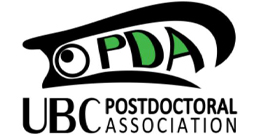 |
UBC Postdoc Research Day - January 18, 2021
Registration and abstract submission is open for the annual Postdoc Research Day!
Held via Zoom, it gives UBC postdocs the opportunity to showcase their research to a "non-expert" audience.
2021's event includes 15-min full talks and 5-min lightning talks, a keynote presentation by Dr. Connie Eaves and Dr. Allen Eaves, a town hall meeting discussing relevant issues to the postdoc community, two career panel discussions, and more!
Prizes will be awarded for the best talks, and the abstract submission deadline is December 15th.
Anyone can attend! Register now
|
|
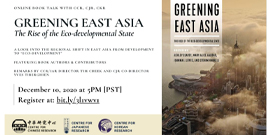 |
Book Talk: Greening East Asia
Thursday, December 10th, 5pm PT / 8pm ET
East Asia hosts a fifth of the world’s population and consumes over half the world’s coal, a quarter of its petroleum products, and a tenth of its natural gas.
Hosted collaboratively by UBC Centre for Chinese Research, Centre for Japanese Research - CJR at UBC and Centre for Korean Research, the event features the authors and contributors of newly published book "Greening East Asia: The Rise of the Eco-developmental State", edited by Ashley Esarey, Mary Alice Haddad, Joanna I. Lewis and Stevan Harrell.
Opening remarks by CCR and IAR director Tim Cheek and CJR Co-director Yves Tiberghien.
Register here
|
|
 |
Meet four students leading new Arts courses in Winter Term 2!
Next term, undergraduate students are leading 16 new seminars in the Faculty of Arts!
Among them is fourth-year Film Production and Japanese major Shay Scholes, who is coordinating Japanese Pink Cinema: Gender, Sexuality, and Screen Studies (ASIA 490Z 001).
The Student Directed Seminar program gives upper-year undergraduates the opportunity to work with a faculty member to design and lead their own 3-credit seminar class with a small group of peers on a topic not currently offered at UBC. Find out more from Shay and three other Student Directed Seminar coordinators as to why they are excited to explore their subjects with other students.
Read more here |
|
 |
UBC Bhangra Club Holiday Treat Box
UBC Bhangra Club has teamed up with local vendors to create a holiday treat box, with all profits going to the Sahaita Foundation, a non-profit organization which assists Punjab farming families and communities.
The $20 boxes are a mix of handcrafted chocolates, Oreo cookie dough bars, hot chocolate bombs, Chicago mix popcorn, candy canes and a custom holiday card. Orders need to be placed by 11:59pm on Dec. 14 and contactless deliveries will occur between Dec. 20-21 to locations across the Lower Mainland, BC.
Email with questions here, check them out on Instagram and orders can be made here.
|
|
 |
Thursday,
Thursday, December 17, 5pm PT / 8pm ET
The Centre for Japanese Research (CJR) is delighted to announce a roundtable on the role of the historical imagination in historiography, focusing on approaches to writing women’s history. Professors Gaye Rowley (Waseda University), Amy Stanley (Northwestern) and Marcia Yonemoto (University of Colorado, Boulder) will draw from their scholarship and respond to Prof. Stanley’s new book, Stranger in the Shogun’s City, in considering how we reconstruct the past, particularly when faced with scanty documentary evidence.
Register here
|
|
 |
Happy Holidays and here's to 2021!
UBC Asian Studies Department wishes all staff, faculty, students, alumni and associates a very happy and safe upcoming holiday season.
Please be advised that the Asian Studies “office” will close for the holidays at end of day on December 23rd, after which all staff will be on vacation until we re-open for usual hours on Monday, January 4th.
In line with UBC updates, Term 2 classes will now start one week later on Monday, January 11th.
|
|
|
| UPCOMING VIRTUAL EVENTS |
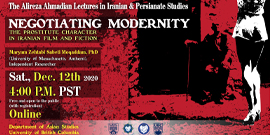 |
Negotiating Modernity: The Prostitute Character in Iranian Film and Fiction
Saturday, December 12th, 4pm PT / 7pm ET
Prostitutes have been judged, stigmatized, criminalized, pathologized, and marginalized, but also sought after, idolized, and revered. Their profession is a paradox—shrouded in myths—constructed, conceived, and theorized in a myriad of ways due to its varying legal definitions and the numerous permutations it undergoes to contravene the laws.
Dr. Maryam Zehtabi Sabeti Moqaddam will scrutinize the image of the prostitute and her inflationary popularity in written and visual texts from the Constitutional Revolution (1906-1911) to the Islamic Revolution (1979) to shed light on the shifts in discourse on prostitution in the twentieth-century Iran.
Register here
|
|
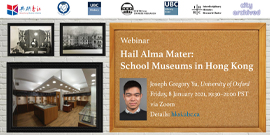 |
Hail Alma Mater: School Museums in Hong Kong
Friday, January 8th, 7:30pm PT / 10:30pm ET
In Hong Kong, over the past three decades, there has been a noticeable increase of non-governmental museums. Among them is a type peculiar to Hong Kong—museums that are dedicated to schools. Not only do such museums forge a sense of belonging for current pupils, alumni, and staff, given the centrality of the schooling experience (for better or for worse), framing such experiences within the context of museums also reflects the myriad ways people seek to make sense of their identity as well as their relations to their city.
Joseph Gregory Yu, a Ph.D. candidate at the University of Oxford and Honorary Curator for the Queen’s College History Museum, will take us on a journey and explain what we can learn from the efforts to “museumize” by the oldest public school in Hong Kong.
More details
|
|
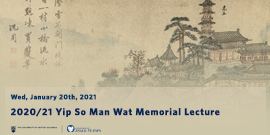 |
2020/21 Yip So Man Wat Memorial Lecture: Elegance and Vulgarity: The Promise and Peril of Things in Ming-Qing Literature
Wednesday, January 21st, 4pm PT / 7pm ET
How is value assigned to things? What is the line between the refinement of good taste and the force of obsession? In this lecture, Professor Wai-yee Li (Harvard University) will discuss the figure of the vulgar connoisseur in Jin Ping Mei, the contradictions of elegance in a story by Li Yu (1611-1680), and the implications of redefining elegance and vulgarity in The Story of the Stone.
Dr. Li will also present a Research Seminar on Friday, January 22nd, on the topic of "Objectifying People and Humanizing Things in Chinese Literature".
More details
|
|
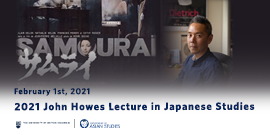 |
2020/21 John Howes Lecture in Japanese Studies: Nouvelle Japonisme: Le Samouraï (1967) and Jean-Pierre Melville’s Cinematic Japan
Monday, February 1st, 5:30pm PT / 8:30pm ET
French New Wave, the art film movement that emerged in the late-1950s France, had a curious obsession with Japan. Cahiers du Cinéma’s adoration of Mizoguchi Kenji, Alain Resnais’s Hiroshima mon amour (1959), Chris Marker’s Sans Soleil (1983) to name a few.
By focusing on Jean-Pierre Melville’s acclaimed 1967 film Le Samouraï, this talk by Professor Daisuke Miyao examines what Melville’s allusion to the samurai seeks to signify. Despite its title, Le Samouraï is not a jidaigeki (period drama) set in Japan but a story of Jef Costello, a contract killer in Paris in the 1960s. Melville’s conception did not only exist in the context of post-World War II France but also descended from the history of Japonisme in France since the nineteenth century.
More details
|
|
|
| Featured Term 2 Courses |
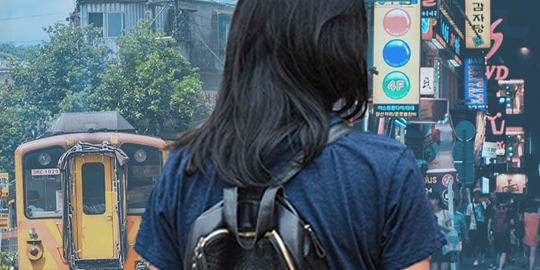 |
Still at a crossroads for your Term 2 undergrad course picks? Luckily for you, we have some amazing suggestions to help you out, including a brand-new Asian Studies course! Click on any of the individual images below to be taken to each course page.
|
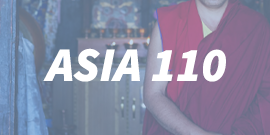 |
Introduction to the Major Eastern Religions
ASIA 110 is an introduction to the major Asian religious traditions (Islam, Hinduism, Sikhism, Jainism, Buddhism, Confucianism, Daoism, Christianity, Shintoism, and Shamanism).
Employing theoretical models drawn from religious studies, students will develop a firm understanding of some of the world's oldest religions.
Learn more |
|
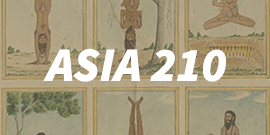 |
Traditions of Yoga
ASIA 210 is a brand-new course! It explores philosophical, religious, and cultural development of yoga in classical and medieval South Asia and its relation to contemporary globalized practice. Today, yoga is practiced in nearly every country in the world, and has fostered a massive, multi-billion-dollar industry. But where did it come from? And how did certain colonial and postcolonial cultural “flows” lead to the globalized tradition found in today’s yoga studios?
Learn more |
|
 |
Yōkai: The Strange & Supernatural in Early Modern Japanese Popular Culture
ASIA 346A focuses on yōkai in Edo period (1600-1868) popular culture, including ghost stories, illustrations, and plays. Background will be provided through readings from earlier periods. The representation of the supernatural will be contextualized through secondary readings on the historical, social, and religious environments.
We will also explore the popularity of “transformed creatures” (bake-mono) in the period and examine the functions they fulfilled.
Learn more |
|
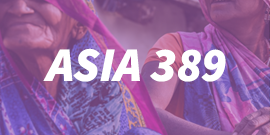 |
Life Writings of South Asian Diasporic Women
ASIA 389 emphasizes theories of representation, subjectivity, agency, difference, and memory. Texts studied include those by Gaiutra Bahadur, Avtar Brah, Sara Suleri, Chitra Bannerjee Divakaruni, Inderpal Grewal, and will allow students to understand how deeply race, migration, indentureship and exile shape SA women's experiences, and how creatively - sometimes even desperately - the women have struggled to control their personal and political lives.
Learn more |
|
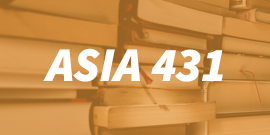 |
Tibetan Literature, Genres, and Book Culture
ASIA 431 features an in-depth look at literature, textual genres, and book and printing culture from the seventh century Tibet to present times. Learn more about the beauty and diversity of Tibetan Buddhist literature, the meaning of scriptures as the embodiment of the “Buddha’s Speech,” and (virtually) engage with the material culture of the Tibetan book at the Museum of Anthropology at UBC!
Learn more |
|
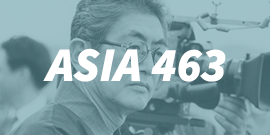 |
Japanese Documentary Media
ASIA 463 is an historical survey of Japanese documentary film and media, including press, photography, reality TV shows, and social media. Documentaries covered offer rich ethnographic descriptions of socio-politico-cultural issues in modern Japan, including Japanese imperialism, trauma of WWII, industrial pollution and disease, energy crisis, crimes and terrorism, political campaigns and the Japanese political system, commercialism, and aging and death.
Learn more
|
|
|
| SPOTLIGHT: Meng Zhang |
|
 |
Interested in what you can do with a degree in Asian Studies? In our Spotlight Interview Series, we ask our students, postdocs and alumni about their career paths, how they became interested in Asian Studies and for any advice they would give to current students.
In this interview, recent graduate Meng Zhang enlightens us on a lesser-researched Chinese goddess, Zigu, and the unusual household item she is a deity of, and shares her best advice for graduate students.
Could you explain to a non-expert what you are researching and why it is significant?
My research mainly focuses on the evolution of and the changes in a Chinese goddess, Zigu, who was regarded as one of the latrine (a.k.a. toilet) deities in pre-modern China. As the latrine goddess, Zigu was commonly worshipped by women before the Song dynasty (960-1279) and was widely invited by literati later on. My research aims to unpack the evolution of Zigu belief from the fifth century to the fifteenth century from multiple aspects, with a specific focus on the gender factor. From a modern perspective, the latrine might be a symbol of pollution and filth, but it is an inevitable part of our daily lives. The study of the latrine deity Zigu should have aroused scholars’ attention, but surprisingly, has not been well-researched.
How did UBC help you achieve your goals?
I think this two-year-study at UBC not only equips me with extensive knowledge but also helps me improve my mental strength. More importantly, UBC helps me gradually have a clear self-cognition of my career. I used to feel lost because what comes with this major is not only the open possibilities but also some uncertainties. Thanks to UBC, studying in this multicultural community and communicating with Asian Studies’ peers help me set up an optimistic and open mindset towards new challenges and an uncertain future. The various possibilities and uncertainties still exist, but I am well-prepared to confront them.
Read more |
| ASIAN LIBRARY NEWS |
|
 |
Access Library materials pick-up service before Dec 22
Ensure access to items available through the materials pick-service before the holiday by ordering items by December 15 and arranging for pick-up before December 22.
Learn more |
|
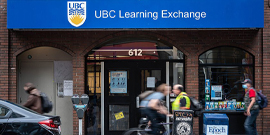 |
New Downtown Eastside Research Access Portal
The DTES RAP provides access to research and research-related materials relevant to Vancouver’s Downtown Eastside through an easy-to-use public interface.
Read more |
|
|
| OPPORTUNITIES |
 |
|
Call for Submissions: The 2nd Southeast Asian Conference on Education (SEACE2021)
The Southeast Asian Conference on Education seeks to identify the challenges and highlight the strength in the way ASEAN countries address and tackle the region’s educational needs, at both the national level and at the region-wide level, such as internationalisation, multiculturalism, connectivity, mobility and accessibility. SEACE2021 encourages academics and scholars to meet and exchange ideas and views in a forum stimulating respectful dialogue and the Organising Committee welcomes papers from a wide variety of interdisciplinary and theoretical perspectives, and submissions are organised into the streams and substreams listed on their website.The early bird abstract submission deadline is December 10. For more information, please visit the SEACE2021 Call for Papers page.
Winter Institute Events: Sustainable, Inclusive and Thriving Communities
The 2020 CTLT Winter Institute will take place online from December 14-17. The CTLT Winter Institute will focus on the fundamentals of online teaching and learning issues and is designed to help participants enhance their understanding of sound online teaching practices and how to implement them in their teaching contexts. The theme of this year’s Winter Institute is Sustainable, Inclusive and Thriving Communities. Session materials and relevant resources are curated on the UBC Wiki to support your ongoing learning.
(Paid Opportunity) Circumference Poetry Journal Open for Submissions
Circumference (founded in 2003) is a journal for poetry in translation and a home for writers, artists, poets, and translators who share a deep interest in the world. Special interest is given to new translations of poetry and drama, particularly (but not exclusively) from contemporary authors, and it is expanding to include interviews and dialogues between artists and thinkers of all stripes: conversations where disagreement tends to enrich debate, rather than suspend it, and profiles and long-form writing that sheds light on literary and artistic praxis around the world. All poems are published in their original languages alongside their translations.
Call for Abstracts: 'Writing the Supernatural into History' Graduate Symposium
The Graduate Association of East Asian Studies, an informal group of UK-based postgraduate students studying East Asia, is holding a graduate symposium entitled, 'Writing the Supernatural into History in Pre-Modern East Asia,' taking place online in April 2021. This one-day symposium invites abstracts of 250 words for presentations of 15-20 minutes or panel proposals of 750 words that explain the contributions of each panellist (three at most) and the panel as a whole. Submissions on the supernatural in relation to history and/or historiography focusing on East Asia before 1900 are preferred, but other historical periods and geographical regions are also welcome for the perspective they provide. The hope is to bring together graduate students at any stage of their research for an exchange of ideas on this topic within the context of pre-modern East Asia (China, Japan, and Korea). The abstract submission deadline is December 31. For more information or submissions, please contact gradaeas@gmail.com.
Postdoctoral Fellowship Announcement: Harvard University Program on U.S.-Japan Relations
Harvard University's Program on U.S.-Japan Relations (part of the Weatherhead Center for International Affairs (WCFIA)) is offering postdoctoral fellowships for social scientists. Scholars in a broad range of fields, including anthropology, economics, education, history, international relations, law, political science, public health, public policy, and sociology, are invited to apply. A knowledge of the Japanese language is not required. The fellowship recipient must hold a doctoral degree by August 1, 2021. The application deadline is January 7, 2021. The grant includes a stipend of $60,000 (over a 10-month period); health insurance coverage for grantee; and up to $5,000 in research funds. This fellowship is made possible by generous support from the Edwin O. Reischauer Institute of Japanese Studies. For the application form and instructions, please click here.
Call for Submissions: University of Hawai’i-Mānoa Graduate Student Conference
The University of Hawai’i-Mānoa is holding its 32nd annual School of Pacific & Asian Studies (SPAS) Graduate Student Conference online from April 14-15, 2021. Titled "Innovation, Adaptation, and Resilience: Overcoming Challenges Across Asia", submissions are welcomed from any discipline that tackles novel approaches to both new and old challenges in Asia. Applicants should submit a 250-300 word abstract to gradconf@hawaii.edu with “SPAS 2021 Grad Conf Abstract” as the subject by January 31, 2021. Please direct any questions to conference organizers Kimery Lynch and Hannah Cole at gradconf@hawaii.edu |
|

























